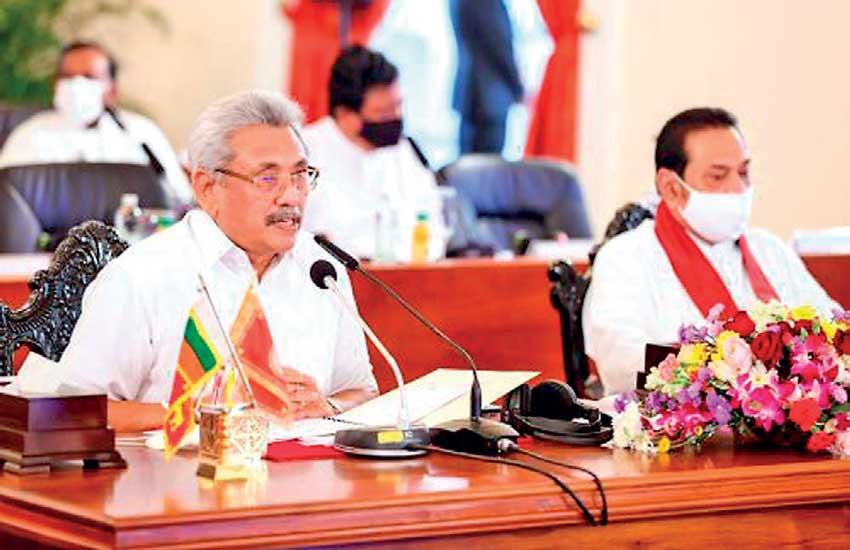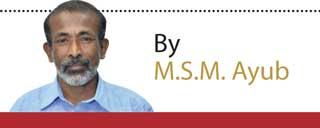Reply To:
Name - Reply Comment

The All Party Conference was held on March 23, under the patronage of President Gotabaya Rajapaksa and Prime Minister Mahinda Rajapaksa at the President’s House. Photo courtesy- Colombopage.com
The APC was convened at the instance of former President and the leader of the Sri Lanka Freedom Party (SLFP) Maithripala Sirisena and was held at the President’s House
Even if the current leaders are genuinely serious about the APC, the issue expected to be resolved is totally different from the ones handled by the previous APCs
 With the failure on the part of the government to find solutions to the current economic crisis and the anger among the masses over the crisis messing up and devastating their day-to-day life, the desperation among the leaders of the government is also increasingly visible.
With the failure on the part of the government to find solutions to the current economic crisis and the anger among the masses over the crisis messing up and devastating their day-to-day life, the desperation among the leaders of the government is also increasingly visible.
President Gotabaya Rajapaksa appointed an 11-member Economic Council comprising Cabinet ministers and high ranking officials including those of the Central Bank and the Treasury on March 7 to find solutions to the current economic issues. In the following week, on March 15, he appointed a 14-member Advisory Committee comprising business leaders to assist the Economic Council. The Advisory Committee which met on March 21 in turn has proposed to appoint a technical team consisting of officials of the Central Bank and the Treasury to formulate programmes proposing international financial assistance. They also proposed to identify a team of experts to assist the Finance Minister apart from appointing a financial and a legal advisor.
The “All Party Conference” (APC) convened by President Rajapaksa on March 23 to discuss the same issue was the latest of this series of lifelines being sought. However, during the deliberations of the “APC,” Finance Minister Basil Rajapaksa, contesting the views of some of the participants said that assistance of a group of international experts has to be sought to deal with the international financial institutions. He argued that there are no competent local experts for this purpose. So, the process of
seeking lifelines is to be continued.
The APC was convened at the instance of former President and the leader of the Sri Lanka Freedom Party (SLFP) Maithripala Sirisena and was held at the President’s House. The question remains as to whether it can be called an APC as the main Opposition of the Parliament and the strongest pressure group among political parties; the Janatha Vimukthi Peramuna (JVP) had boycotted it. However, participation of the Tamil National Alliance, (TNA) which normally distances itself from the national issues, except for the ethnic problem, is encouraging.
The Conference started with an outline of the current economic situation by the Governor of the Central Bank Ajith Nivard Cabraal. His speech however, created an unpleasant situation at the outset as he seemingly politicised it by criticising the former government led by President Sirisena and Prime Minister Ranil Wickremesinghe.
Wickremesinghe straightaway questioned the propriety of such a remark at a forum meant for the cooperation among political parties to seek solutions for a national crisis.
He sarcastically argued that the discussion would end up blaming King Vijaya, the first king in Sri Lanka for landing in the country, if he replies to the Governor and the government members in turn reply to him which might ultimately go deep into the history. The President had to intervene to prevent a conflict by apologising to United National Party (UNP) leader. Wickremesinghe also criticised the government for not presenting the IMF report on the country the Parliament while preparing to seek assistance from it. When Finance Minister said that the government has received only a draft and not a report from the IMF, the former Premier argued that then the draft has to be presented in the Parliament.
The meeting in general posed the question as to how the party leaders are going to find solutions to the current crisis with a series of speeches which are as usual aimed at proving their respective party ideologies or insisting on their demands. For, instance, the TNA spokesman M.A.Sumanthiran stated that the Tamil diaspora was prepared to invest in Sri Lanka, but the government must lay the foundation for it by strengthening process of devolution of power.
The poverty of ideas among the politicians for the resolution of national crises was well evidenced at the conclusion of the conference. It is not clear if one can expect such ideas at least at the next sessions of the conference, if held. Even such ideas have to be cut and shaped through a professional discussion,
without giving way for party politics.
Politicians would be able to formulate a programme to resolve issues that are political in nature, if they have the will and commitment, even if the conference is properly organised and conducted. But the current crisis demands special expertise which most of our politicians lack, apart from the will and the commitment.
The previous APCs convened by the leaders of the past were different from the current effort. They were mainly political in nature, especially aimed at resolving the ethnic problem and could have succeeded, had the leaders had the will and commitment. In short, all previous APCs collapsed halfway through or at the outset, sometimes laying the foundation for the similar future efforts.
Following the 1983 anti-Tamil pogrom, Indian leaders intervened in the island’s ethnic conundrum and the then Indian Prime Minister Indira Gandhi sent two high ranking officials, Gopalaswamy Parthasarathy and Romesh Banadari to persuade President J.R.Jayawardene to accept the concept of devolution of power. Jayawardene convened the first APC to discuss the Indian proposals on December 21, 1983.
He presented Parthasarathy’s proposals as an annexure to his speech at the conference. The contents of the annexure “C” as it was known then later became the guideline that turned the course of the discussions on the ethnic problem. However, the APC collapsed by December 1984 with the escalation of hostilities between the Tamil armed groups and the security forces.
President Ranasingha Premadasa called the second APC in 1989. Previously he had invited the LTTE and the JVP, the two armed groups then fighting the armed forces in the North and the South, for discussions. Only the LTTE accepted the invitation and registered their political party, the People’s Front of Liberation Tigers (PFLT) with the Elections Department. Premadasa wanted to make the other political parties also commit themselves to any agreements with the LTTE and called an APC.
Several LTTE leaders led by Yogarathnam Yogi attended the first session of the APC which was held at the BMICH on August 12, 1989. However, the conference was confined only to a speech by the President by which the other political parties in the south took offence and the main Opposition, the SLFP decided to boycott the next sessions
of the conference.
In parallel discussions between the leaders of the government and the LTTE, the latter insisted on the repealing of the 6th Amendment to the Constitution which made it compulsory for the Parliamentarians and the State officials to take oaths against separatism and the dissolution of the merged North-Eastern Provincial Council headed by Chief Minister Varadharaja Perumal. Premadasa did not have the will or the Parliamentary power to repeal the 6th Amendment. The UNP had only 125 seats in Parliament.
However, in August 1990, he dissolved Perumal’s council amending the Provincial Council Act, using Perumal’s resolution in his council in March 1990 which warned that the council would declare independence within a year, if the government failed to meet 19 demands it had adopted. By the time the LTTE had resumed hostilities killing over 600 policemen in the East and the APC was
also left to die.
The most successful all-party forum was the All Party Representative Committee (APRC) appointed by President Mahinda Rajapaksa in 2006 to resolve the National question. After holding 63 sessions the APRC produced an interim report in August 2007 which was presented later to President Mahinda Rajapaksa. With the escalation of the war the APRC process was also collapsed and its interim report never came out.
In essence, all past APCs have helped the governments to drag on with problems keeping the masses in suspense and hope. Even if the current leaders are genuinely serious about the APC, the issue expected to be resolved is totally different from the ones handled by the previous APCs. The gap between the severity of the current problem and the capacity of the politicians to address it has been proven to be vast. Their lack of commitment is also vividly evident by their behaviour in Parliament. This poses the question as to how the same politicians would come up with the expertise, will and the commitment to resolve the current crisis at a different forum such as the APC.